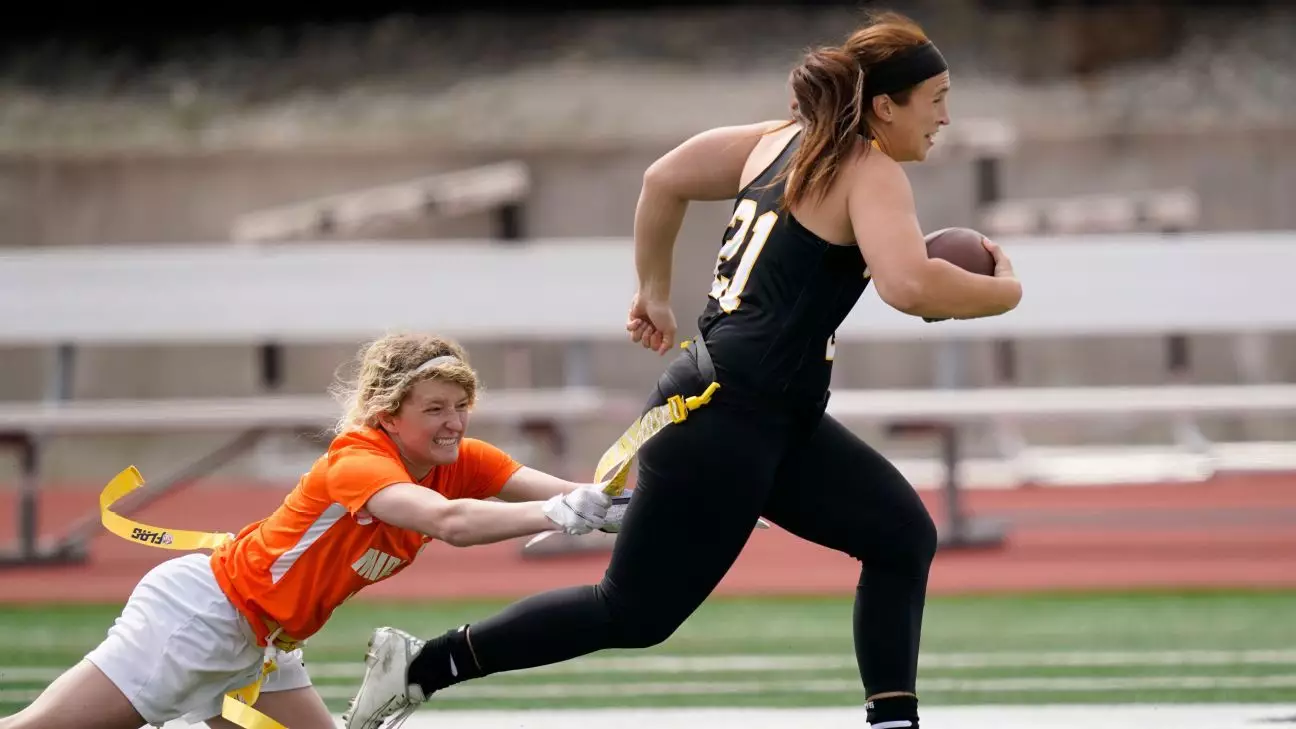This spring, the Atlantic East Conference is making waves in the world of collegiate athletics by introducing its inaugural varsity women’s flag football season. This remarkable move positions the Atlantic East as the first NCAA conference to formalize women’s flag football as a varsity sport. The exciting development has sparked hope among athletes, coaches, and sports organizations that flag football may soon gain NCAA championship status. According to Rebecca Mullen, interim commissioner of the Atlantic East, this initiative presents a “unique opportunity” for growth and visibility in women’s sports.
The decision to embrace flag football at the collegiate level has not occurred in a vacuum. The National Football League (NFL), with its significant influence and resources, has played a crucial role in fostering this movement. Through its flag football operator, RCX Sports, the NFL has provided essential funding and support for the Atlantic East’s launch, helping to forge a path that could potentially reshape the landscape of women’s athletics in the NCAA.
Vital to this initiative’s success are partnerships that extend beyond the confines of collegiate athletics. Notably, the Philadelphia Eagles have committed themselves to promoting girls’ participation in flag football. They are not only hosting the Atlantic East’s media day to commemorate this momentous occasion but are also deeply involved in introducing flag football as a legitimate sport at high school levels across the state. Julie Hirshey, vice president of community relations for the Eagles, highlighted the importance of inclusive opportunities, stating, “This milestone moment fosters a more inclusive experience on the field of play.”
The transition from club sport to sanctioned varsity status reflects an increasing recognition of the need for women’s sports to be elevated within the athletic framework. The Atlantic East Conference initially introduced flag football as a club sport in 2024. The spring season promises a competitive structure, complete with a regular season and playoffs, engaging schools like Centenary University, Eastern University, and others in this burgeoning sport.
While NCAA Division III schools do not offer athletic scholarships, significant initiatives like the International Women’s Flag Football Scholarship Program, supported by the NFL, are emerging. This program allows international players to achieve their academic and athletic aspirations in the United States, granting them the opportunity to play flag football at the collegiate level. These advancements are particularly promising in light of the increasing popularity of flag football: as reported by the National Federation of High Schools, 2023 saw about 500,000 girls, ages 6 to 17, actively participating in flag football—an impressive 63% growth since 2019.
The broader push for flag football’s recognition is bolstered by its potential inclusion in the Olympics, with the NFL advocating for its entry into the 2028 games. The sport currently holds a spot in the NCAA’s Emerging Sports for Women program, which serves as a precursor to NCAA championship status. For flag football to attain this recognition, there must be at least 40 institutions sponsoring the sport at the varsity level, paving the way for increased legitimacy and support.
Mullen expresses her excitement for the ongoing support and growth in women’s sports, envisioning a future where more schools and conferences invest in similar initiatives. The ripple effect of this singular move could transform industry norms, encouraging more universities to recognize the importance of women’s sports and to create opportunities for young female athletes.
As flag football continues to gain traction, the implications extend beyond the confines of academia. This burgeoning movement embodies a broader cultural shift towards gender equality in sports, positioning young women to fulfill their athletic dreams alongside their male counterparts. As the inaugural season of women’s flag football in the Atlantic East Conference gets underway, it stands as a beacon of hope and inspiration for aspiring female athletes everywhere. With the support of the NFL and passionate advocates, the goal of establishing flag football as a recognized NCAA championship sport seems more attainable than ever.


Leave a Reply